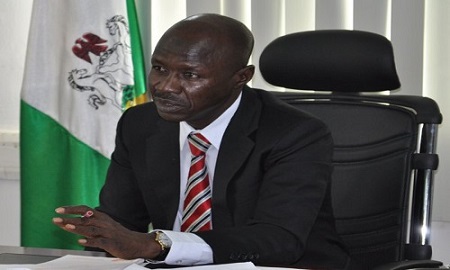Hot Stories
Recent Stories
Professor of Law Blasts EFCC Boss Over Treatment of Suspects...Read What He is Saying
Posted by Samuel on Thu 02nd Jun, 2016 - tori.ngThe Chairman of the Economic and Financial Crimes Commission has come under fire from a professor of Law over the handling of suspected fraudsters.

Ibrahim Magu
The law professor tackled the Economic and Financial Crimes Commission’s boss, Ibrahim Magu, for claiming that everyone arrested and interrogated by the anti-graft body are guilty of fraud.
The professor, Paul Idornigie, who is the head of the Department of Commercial Law at the Nigerian Institute of Advanced Legal Studies in Abuja, said Mr. Magu’s claim was “wild and unexpected of a national leader”.
Premium Times reports that Mr. Idornigie, who spoke to journalists on Wednesday on a paper titled, “Reporting of court proceedings by media; uses and abuses”, said the EFCC chairman must avoid making such assumptions in the discharge of his duties.
Mr. Magu had said on a Channels Television programme that any one invited by the commission for questioning must be found to have a criminal record, stressing that the commission only invites “the guilty” for questioning.
“We don’t chase innocent people; we investigate people before we arrest them. We follow the money, we trace when you received the money, and we also investigate how you utilized the money,” he said.
“That’s why anybody that is invited here will not come out clean, because we do our homework before we invite you. We may investigate for a year or six months and the person would not know,” Mr. Magu said.
But the professor said the law presumes a person innocent until he is found guilty by the same courts of law.
“Even if you have found certain evidence against the accused, you do not know his defence, so you cannot pronounce the person guilty, ahead of the determination of the case in courts of law,” Mr. Idornigie said.
Also speaking at the event, the Chief Judge of the Federal High Court of the FCT, Ishaq Bello, called on judiciary reporters to avoid ambiguous reporting.
He said such reporting styles ware not only against the provisions of the law, but also amounted to an abuse of judicial authority.
Also speaking, the organiser of the program, Charles Odenigbo, said the media should avoid pronouncing an accused guilty, ahead of the determination of his case.
Mr. Odenigbo, a lawyer and president, Media Law and Social Development Initiative, said the predisposition of media practitioners towards a given case could cause sensational reporting, which results in wrong interpretation of court proceedings.
Top Stories
Popular Stories
Stories from this Category
Recent Stories






















































